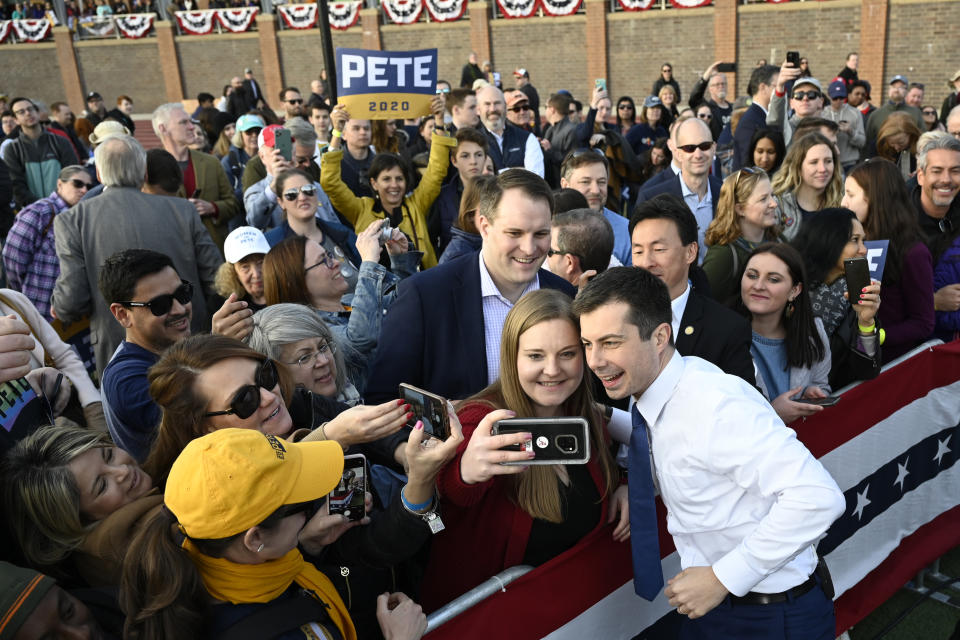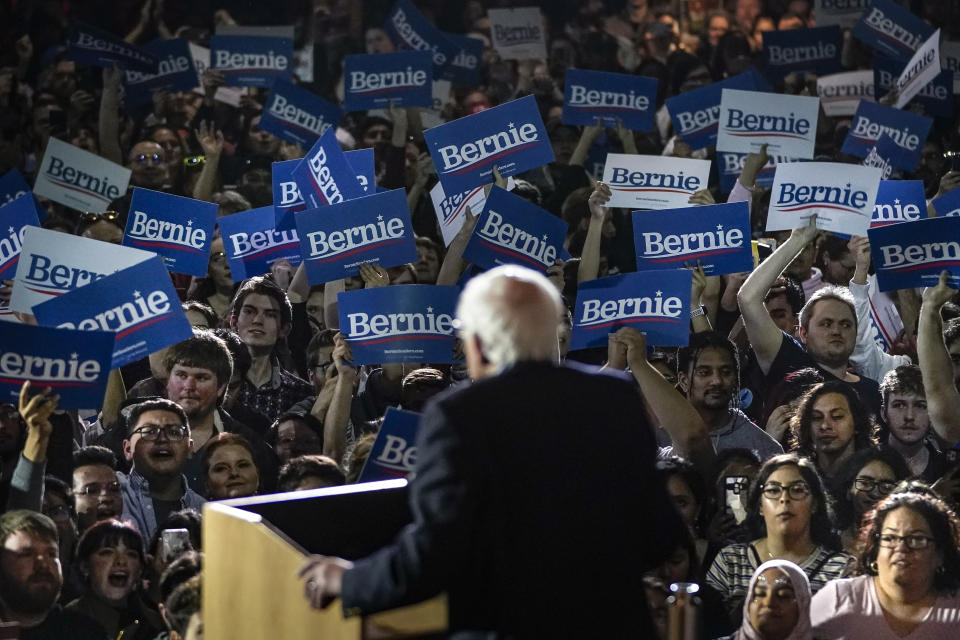Every Democrat running for president is at least open to taxing stock trades
Pete Buttigieg came out for a financial transaction tax this week. The former South Bend, Ind., Mayor proposed a 0.1% tax on all securities trades to “curb inequality and Wall Street gambling that causes ‘flash crashes.’”
Michael Bloomberg came out with a similar plan last week. If he has his way, you’ll also pay 0.1% every time you trade a stock, a bond or a derivative.
The idea — which has very few fans on Wall Street — has now become the consensus among Democratic contenders for president. Yahoo Finance found that all 8 Democratic candidates are in favor of a financial transaction tax – or at least “open” to the idea.
Candidates like Bernie Sanders and Bloomberg have come forward with plans for such a tax. Others, like Former Vice President Joe Biden and Sen. Amy Klobuchar, have signaled a willingness to look at the issue.
“I’m glad to see presidential candidates embrace this common-sense solution,” Sen. Chris Van Hollen (D-MD) said in a statement to Yahoo Finance. Van Hollen has introduced legislation that would tax the sale of stocks, bonds, and derivatives at 0.1% (just like Bloomberg); he’s been pushing the idea since 2015.
The Democrats “have such ambitious spending plans that you've got to come up with some credible way of paying for it and going after Wall Street transactions is a juicy target,” says Greg Valliere, chief U.S. policy strategist at AGF Investments and a close observer of financial issues in Washington D.C.
The case for and against it
Those opposed to the idea, including most of the financial industry, say a tax would hurt the economy and impact a wide array of everyday investors, not just big Wall Street firms.
Many are quick to point out that a financial transaction tax would impact every 401(k), mutual fund, and ETF, not just when a consumer buys or sells it, but when stocks and bonds within a fund are traded.

Here’s the take from the Investment Company Institute, the leading association representing mutual funds, ETFs, and other such entities: “A more accurate name for a financial transaction tax is a retirement tax,” an ICI spokesman said. “Even though it sounds small, it would cost American families billions of dollars a year, including those saving in IRAs and 401(k)s for retirement and 529 accounts for their children’s education.”
Initially, “the tax hit would be very modest,” Valliere says, “but once you begin something like this, it becomes very tempting to increase it. You're on a slippery slope, in my opinion.”
The supporters of a tax, beyond pointing to the billions, if not trillions, it would raise, argue that a tax on financial transactions would cut down on speculative short-term or high speed trades that aren’t helping the economy anyway (and have the potential to threaten the stability of the entire financial system).
Van Hollen says that a “small financial transaction fee on these high-rollers will help curb risky behavior while generating revenue that we can invest in growing our economy.”
Supporters also note that the U.S. itself has had a financial transaction tax at various points in its history and some European countries currently levy the tax. European economies have continued to grow even with the tax, but claims that it "didn't affect their financial markets at all" have been debunked by fact-checkers.
The differences between candidates’ plans
Bernie Sanders has the most aggressive plan in the field and also has helped write a bill that’s currently languishing on Capitol Hill.
“It is long past time for Congress to rein in the recklessness of Wall Street billionaires,” Sanders said last year when he announced his bill to institute a tax, calling it a tax on “Wall Street speculation.”
Sanders would introduce a tax of 0.5% on stock trades, 0.1% on bonds, and 0.005% on derivatives. He estimates the tax would generate up to $2.4 trillion over the next decade to fund his plans like wiping away existing college debt and making public college free.
Sen. Elizabeth Warren’s plan (like Bloomberg’s) would impose a tax of 0.1% on bonds, stocks, and derivative trades. Her campaign estimates this rate would raise about $800 billion over the next 10 years.
The Buttigieg plan also sets the rate at 0.1% with one extra wrinkle. Buttigieg would “make big banks pay every year for the extra financial crisis risk they pose” on top of the financial transaction tax. His campaign estimates that the dual measures would “raise $900 billion to pay for tax relief for working and middle class Americans and to invest in priorities like education, infrastructure and protecting Social Security.”

Former Vice President Joe Biden has also expressed support for the idea. He said plainly in a CNBC interview, “I think we should have a financial transactions tax” but has not offered details about what rate is appropriate.
Klobuchar (D-MN) “is open to a financial transaction tax,” according to a campaign spokesperson, but only “if it is structured in a way that will not harm pensions or the middle class."
Candidates further down the ballot are also on board. Tom Steyer, who had a career in finance, has said he supports a tax on Wall Street, “including a tax on stock transactions and derivatives”; but he said, “I am not committed to the particular formula in” Sanders’ bill. Tulsi Gabbard is a co-sponsor of the House version of the Sanders bill.
The Trump administration has come out squarely against the idea. "I am very concerned that that would destroy our capital markets,” Treasury Secretary Steven Mnuchin said of the idea in December. “American holders of mutual funds would bear the majority of the cost."
Even with a Democratic president, will it ever happen?
“I think the bottom line is we're not going to get anything like this as long as the Senate stays Republican,” says Valliere.
And there’s a decent chance it would have an uphill climb even in the Senate even if the chamber flipped to Democratic control this year.
The Democratic majority leader would almost surely be Charles Schumer of New York, who has opposed the idea in the past. He helped stop a bill in 2009 that would have imposed the tax in the wake of the financial crisis.
Meanwhile, the idea likely isn’t receding from the campaign trail as candidates — like front-runner Bernie Sanders — face increasingly pointed questions about exactly how they’d pay the massive bill from their proposed expansion of government.
Update: This story has been updated to include a new plan announced Monday by Pete Buttigieg and a statement from Amy Klobuchar’s spokesperson.
Ben Werschkul is a producer for Yahoo Finance in Washington, DC.
Read more:
Bloomberg's new plan to crack down on Wall Street includes a financial transaction tax
How Mike Bloomberg’s new retirement plans stack up vs. other Democrats
Bloomberg is smashing Obama's record for POTUS candidate TV-ad spending
Read the latest financial and business news from Yahoo Finance
Follow Yahoo Finance on Twitter, Facebook, Instagram, Flipboard, LinkedIn, YouTube, and reddit.

 Yahoo Finance
Yahoo Finance 
